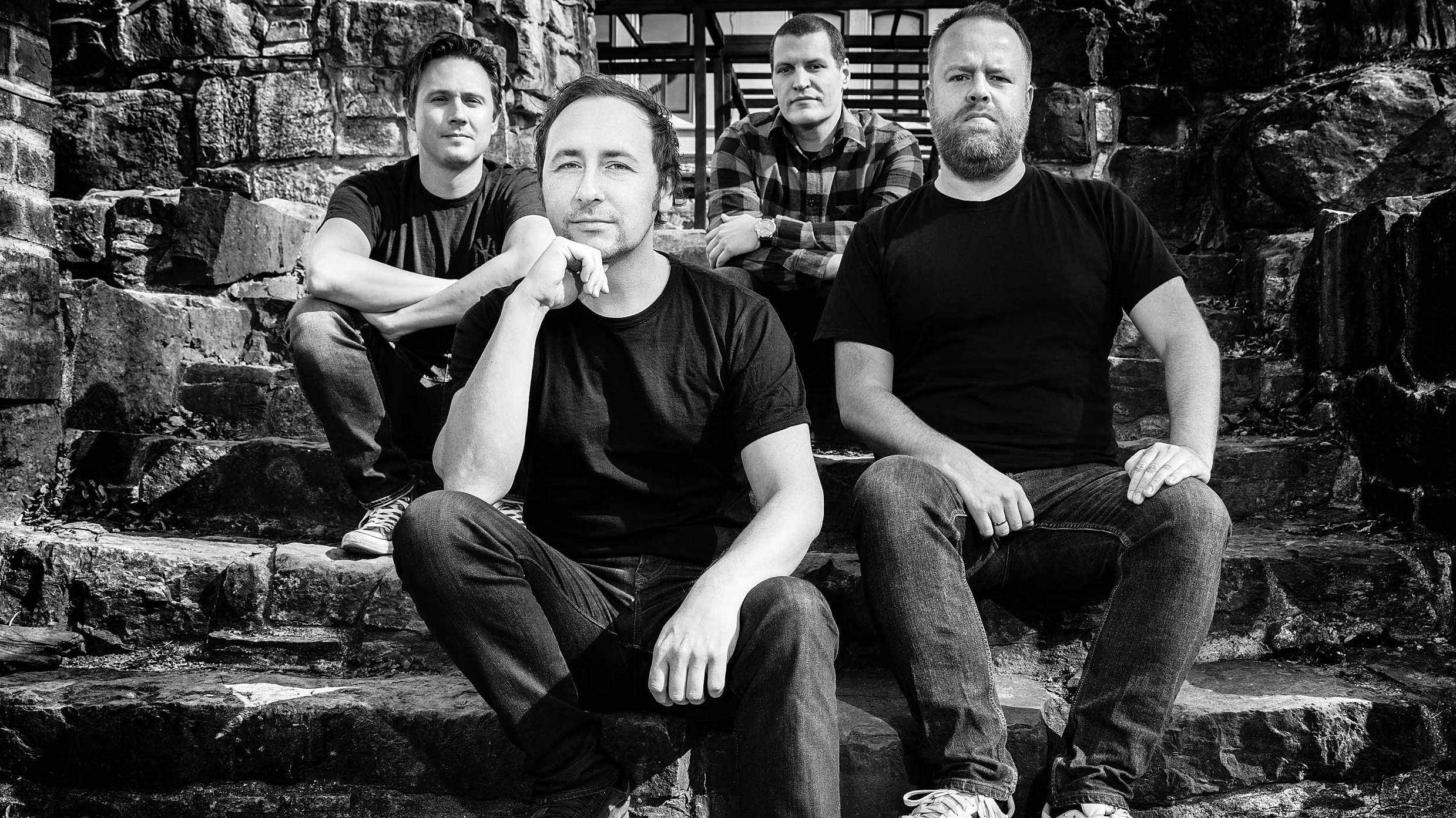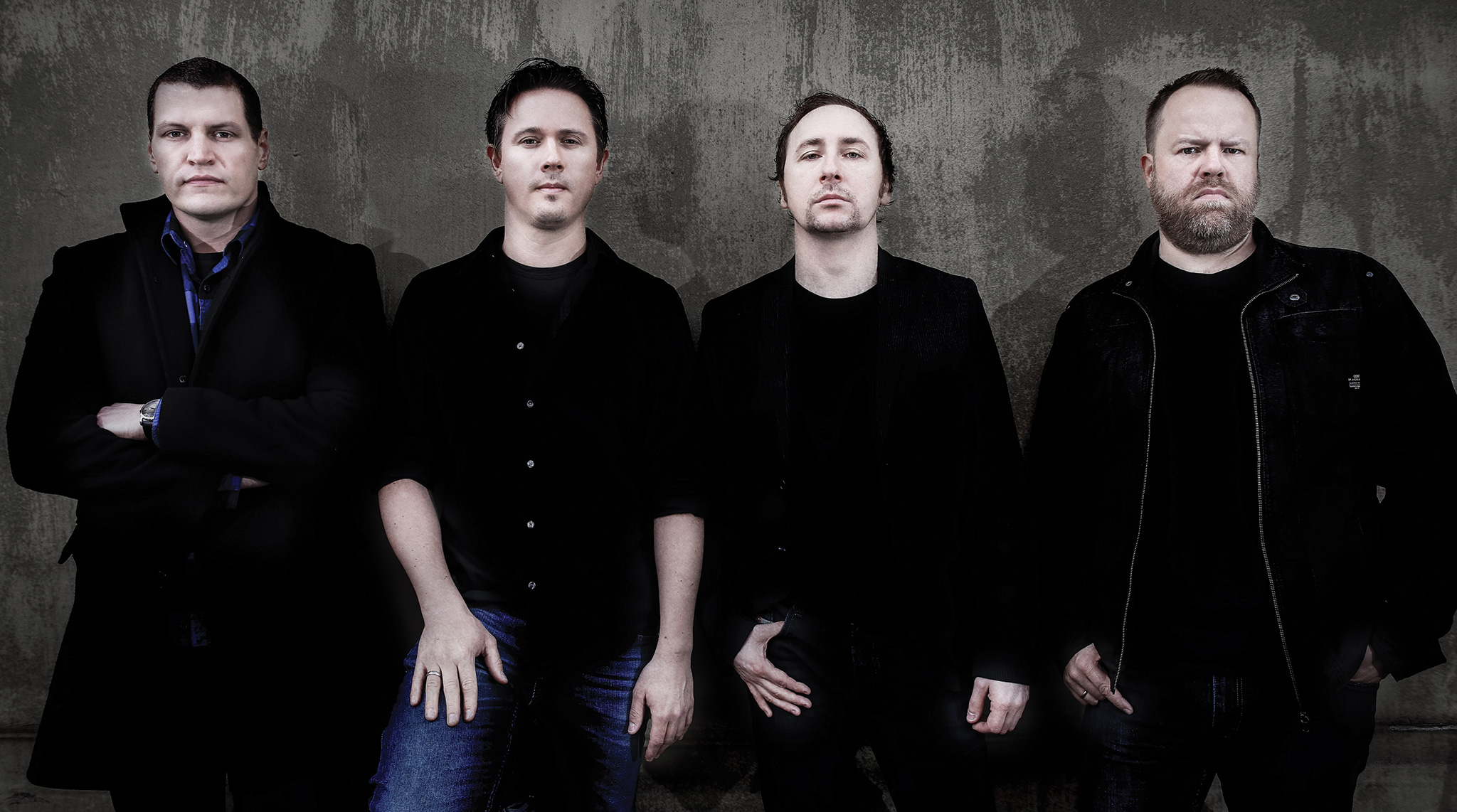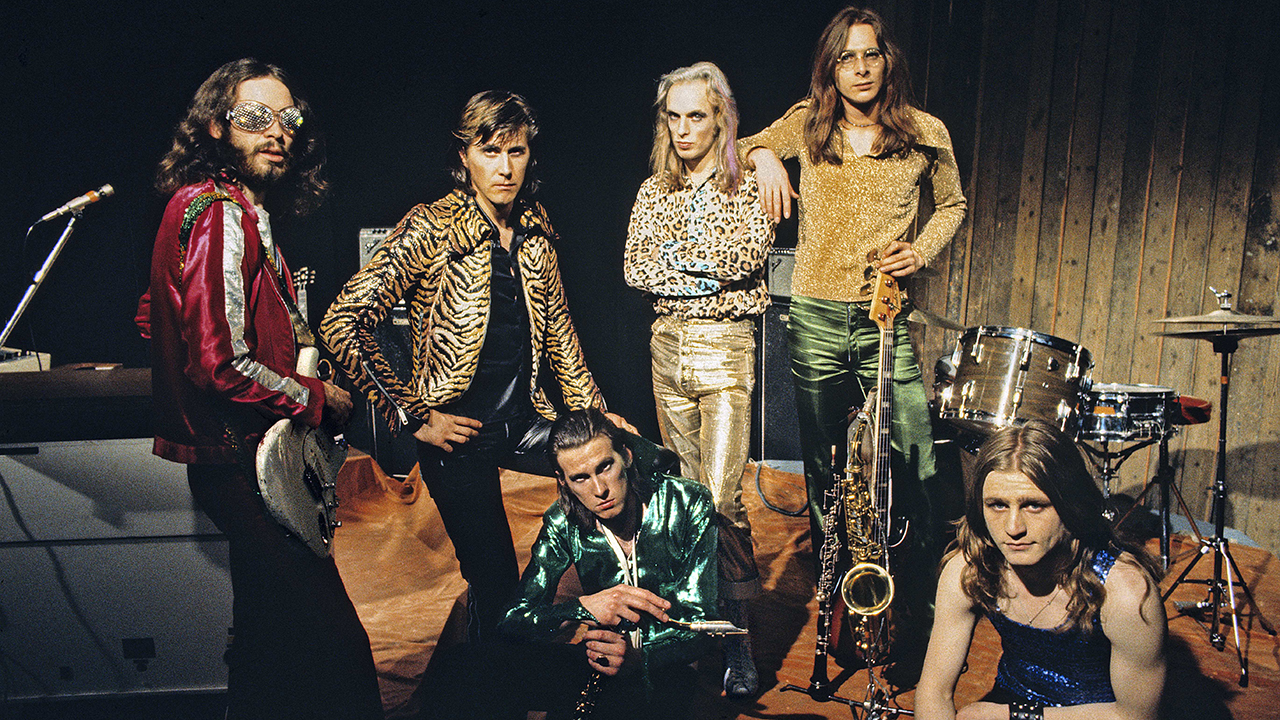Norwegian proggers Airbag show what happens when prog and metal collide
Norwegian atmospheric prog rockers Airbag explore the darker side of music – Guitarist Bjørn Riis opens up about fourth album Disconnected

A ll is not well in the world of Airbag. The Norwegians have slowly but steadily become one of the most admired bands in the modern prog scene, propagating a languid but emotionally turbocharged take on classic Floydian atmospheric rock that has always had a certain melancholy hue. But on the band’s fourth album, the glimmers of hope offered on previous albums, like 2013’s stunning The Greatest Show On Earth, seem to have been extinguished. From its austere, minimalist artwork to an overall sound that’s markedly less bright, Disconnected is a self-evident howl of anguish. According to founder member and guitarist Bjørn Riis, the creation of this dark and frequently despondent record began during a moment of personal crisis.
“I had a big revelation a few years back,” he says. “I suddenly realised I had a job I hated, and I hated pretty much everything in my life. So that was the first song I wrote for the album, and the lyrics reflect the state I was in. The rest of the songs and the rest of the album just grew from there. I don’t think any of our albums are overly happy but Disconnected is one of our darkest records, if not the darkest.”
We’ve been here before, of course. From Pink Floyd to Porcupine Tree and on into an increasingly unpleasant modern world, prog has often provided a commentary on mankind’s downward spiral into selfish madness and alienation. But there’s something about Disconnected that prods particularly violently at the conscience, as if to awaken us all to the grim reality that we may be sleepwalking through life and doing ourselves a grotesque disservice as a result.
“I think many people go through life thinking that they do what they want to do, they have the friends and the family and the job they want to have, and that everything’s perfect,” explains Riis. “But you also go around with a feeling that something is wrong but you can’t quite put your finger on it. I was forced to not be a creative person at one point. I lost the creativity and I lost the will to be creative and to write music, because something in my life was holding me back, I guess. I’m not saying everyone is in that kind of prison, but more people are than perhaps want to realise it.”
The ominous grey off-switch on Disconnected’s cover seems to shield a familiar litany of contemporary woes, not least the undeniable fact that the ubiquity of the internet and the extraordinary proliferation of social media has created the illusion that somehow human beings are becoming more connected and engaged with their fellow, erm, online entities. Perhaps it takes a pessimist to acknowledge it, but the way that living life online seems to enable people to disengage almost entirely from the real world, real relationships and the here and now provides Disconnected with an undercurrent of highly pertinent despair.
“Yeah, I think that’s true,” Riis notes. “In some way you feel connected to your family and friends and to the rest of the world, but in reality you’re just sitting in front of a telephone or a computer and you think you’re connected to everyone but you’re not, and you sort of lose yourself somehow. So that’s partly the theme of the album. You know, when you get kids, your priorities change and you have to realise that they change and accept that they do. Once you do that, you’re freeing yourself from a lot of negative and destructive things, but it makes the world a scarier place sometimes too.”
Musically, the new Airbag album is no radical departure from previous records, but it does showcase the assimilation of a few more influences and unexpected ideas, from unnerving electronic textures to a faint but clearly perceptible darkening of guitar tones and a toughening of the songs’ rhythmic underbelly. It still sounds like Airbag, of course, but those subtle embellishments have really enhanced the musical identity of a band that could easily have slipped into a wholesale reliance on a successful formula.
Sign up below to get the latest from Prog, plus exclusive special offers, direct to your inbox!
“We talked about changing the sound slightly,” Riis explains. “We wanted to strip things down and leave more room for the melodies and the dynamics. It’s also a case that our keyboard player Jørgen Hagen has left the band, so his influence is not there. But it’s also us experimenting more, with more electronic things and heavier, darker guitars and much more space. You always hope the changes will underline the music on the album and since the lyrics are darker this time, we made the music darker as well.”
We have fans in Iran and Syria, places where people can’t get music legally. They’re risking their lives to listen to your music.
Heaviness in prog doesn’t always go down too well with diehard purists, of course. As Beardfish learned to their (admittedly temporary) cost when they released the metal-tinged The Void, straying from the traditional prog path into more gruff, muscular territory can lead to the alienation of more myopic admirers. Ultimately, all bands can do is be true to themselves and their own tastes.
“Well, my background is in heavier stuff, I guess,” Riis says. “When I grew up it was bands like Black Sabbath, Deep Purple and Kiss, and I still listen to a lot of that stuff, and more contemporary heavy stuff like Mastodon and Tool. I always wanted to bring that element into the band. I did that to some extent on my solo album [2014’s Lullabies In A Car Cras__h], but I think the rest of the guys just accepted that I wanted heavier guitars this time. But I don’t think they’re heavier in a Black Sabbath sense, though the overall sound is certainly darker and heavier.”
Disconnected may not exactly veer wildly away from the path that Airbag have walked with style over the last decade, but it does contain their most experimental material, not least the unsettling curveball of Slave, a slow-motion squall of languorous, skewed blues that could give Anathema a run for their money in the heartstring-flaying stakes.
“That song was actually one of the first that we wrote as a band, maybe 15 years ago,” Riis says. “We always liked the music but we just couldn’t fit it into an album before now. So we rearranged stuff and wrote new lyrics and put a lot of electronics on it and I think it turned out great. It’s an unusual song for us but I think it fits the album. We do try to evolve, but I don’t think a band should evolve too much! At least, that’s not natural for me. I don’t like it when bands completely change direction. It could be a good thing but in most cases it seems to be bad – you should stick to what you love. We write the music that comes naturally and we work our way around that.”

One thing you may suspect Bjørn Riis is thoroughly sick of being asked about is the very obvious influence of Pink Floyd in Airbag’s music. What is seldom noted, however, is the intuitive way the Norwegians have co-opted the prog legends’ sense of overpowering space and illusory tranquility without ever sounding like a cheap knock‑off. On Disconnected in particular, Airbag sound like natural heirs to the Floyd throne, primarily because their deft tinkering continues to wring fresh vitality from seemingly well-worn musical ideas. Rather generously, Riis merely chuckles when Waters, Gilmour and the rest are brought up.
“It’s obviously an influence and David Gilmour’s music and playing have meant a lot to me. But I have so many influences that shine through in my playing, I think, and over the years that combination has just become my style. I can hear Sabbath, Joe Satriani, Zakk Wylde and Gilmour all mashed up in there. It’s not something I ever think about when I’m standing there and the ‘record’ button is hit. My solos are purely improvised. I usually do, at most, three takes. There’s something about the first thing you do that gets the right feel and hits the right nerve.”
Striking a nerve is something Airbag seem to be becoming highly adept at, and the timely and arguably universal themes of Disconnected sound custom-designed to resonate with a much bigger audience than those on any of the band’s earlier albums. Riis admits that Airbag aren’t the most dedicated live band (“We like the studio life too much!” he laughs), as all four members have day jobs and familial responsibilities that preclude them from extensive touring. However, the irresistible allure of their sumptuous modern prog excursions hasn’t been dulled by long periods of apparent inactivity. Very much a band who interact with their fans, both online and in the flesh, Airbag have watched their popularity grow enormously, with support coming from the most unexpected places.
“The majority of our fanbase is in northern, western Europe, but we have fans in Iran and Syria, places where people can’t get music legally,” Riis says. “They send us emails saying, ‘I’m sorry, I had to download your music illegally, but I’m not allowed to listen to music at all…’ You just want to send them your whole back catalogue for free! They’re risking their lives to listen to your music. If you’re a student in Iran and you’ve managed to get hold of an internet source and you download some music, if you get found out, you know you’ll at least go to prison. We know there are refugees fleeing from Syria that have Airbag on their iPods. That’s pretty amazing.”
So maybe everything in Airbag’s world isn’t quite as bleak and alarming as Disconnected would suggest. There is, at least, the small comfort that despite the weirdness and chaos of the modern age, music still has the power to transcend cultures, borders and even the very real oppression of whole societies.
“Interacting with fans is a cheap and effective way to promote yourself,” Riis notes. “The fans also feel they have some sense of ownership of the band and they’re supporting the band in a different way than if we just kept our mouths shut and walked around wearing shades all the time! So I don’t hate the internet, despite the effects it can have on people in general. It’s always a pleasure to speak to someone and hear why a certain song means so much to them. You can’t beat the feeling of hearing someone saying your song got them through a hard time.”
As an added bonus, and perhaps one small glimmer of hope in a hopeless world, there’s the heartening news that after taking a year off, Bjørn Riis began a new job, teaching music at a kindergarten, and is extremely happy with the way things have turned out. Maybe the next Airbag album will be a much happier one.
“Yeah, perhaps!” he grins. “I honestly haven’t started thinking about that yet. At the moment I’m working on a new solo album for release sometime next year. But the next album could be a happy record… or something extremely dark!” Riis laughs. “Maybe I’ll get sacked from my job or something. You never know! It’ll be the bitter and angry album!”
Disconnected is out now on Karisma. For more information, visit the band’s official website.
Airbag’s Evolution
We rummage through Airbag’s impressive back catalogue.
**Identity
(Karisma, 2009)
**A strong but perhaps slightly derivative debut, Identity painted Airbag as a very capable and passionate hybrid of prime Floydian grandeur and several recognisable modern prog tropes, from Anathema’s lovelorn atmospherics to the off-kilter elegance of fellow Norwegians Gazpacho, with a dash of Radiohead’s questing instinct thrown in for good measure.
**All Rights Removed
(Karisma, 2011)
**A much more distinctive affair than its predecessor, the second Airbag album again pitched the band’s sound somewhere between classic Floyd and the esoteric charms of prog’s contemporary wave, with plenty of existential unease and an underlying sense of yearning that made even the most languid passages thrum with real import.
**The Greatest Show On Earth
(Karisma, 2013)
**This was the moment when Airbag evolved into something truly special. The Norwegians’ third album was a tour de force of spine-tingling dynamics and widescreen ambience that seemed to stretch and mould the band’s own formula into subtly adventurous new shapes. A cynical, anti‑authoritarian lyrical core added extra emotional weight to a sumptuous triumph.

Dom Lawson began his inauspicious career as a music journalist in 1999. He wrote for Kerrang! for seven years, before moving to Metal Hammer and Prog Magazine in 2007. His primary interests are heavy metal, progressive rock, coffee, snooker and despair. He is politically homeless and has an excellent beard.
